Brian Clegg's Blog, page 16
January 3, 2024
Planes, Trains and Toilet Doors - Matt Chorley ****
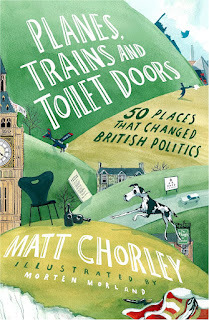 Matt Chorley is one of the best political radio presenters and podcasters around. His coverage of UK politics is sharp and insightful - but always with a sense of humour. He is also a newspaper columnist, though I confess I find his writing style there sometimes too farcical - but that doesn't apply to this book, which takes in '50 places that changed British Politics'. Although there is humour here (quite strong, for instance, on the infamous venture to Barnard Castle), this is primarily a serious look beyond Westminster at a series of key events in often unexpected locations around the country.
Matt Chorley is one of the best political radio presenters and podcasters around. His coverage of UK politics is sharp and insightful - but always with a sense of humour. He is also a newspaper columnist, though I confess I find his writing style there sometimes too farcical - but that doesn't apply to this book, which takes in '50 places that changed British Politics'. Although there is humour here (quite strong, for instance, on the infamous venture to Barnard Castle), this is primarily a serious look beyond Westminster at a series of key events in often unexpected locations around the country.Some are small but significant, such as Gordon Brown getting locked in a toilet. Others involve an event that would change history more directly (or even personally, in the story of Spencer Perceval, the only UK prime minister to be assassinated). Although many of the events were familiar to me as someone with an interest in politics, there was a lot that I never knew - and the whole presents a fascinating insight into the quirks and oddities of our political history.
I was recommended this book by Peter Mandelson (not personally, I hasten to add, but on another excellent podcast hosted by Chorley), and I'm glad I took up his suggestion. It may be (dull sounding) political history, but it's never heavy and very enjoyable. The icing on the cake, which I am sure the author enjoyed, is that at the time of writing, Amazon had it listed as '#2 most gifted in toilet training.'
See all of Brian's online articles or subscribe to a weekly digest for free here You can buy Planes, Trains and Toilet Doors from Amazon.co.uk, Amazon.com and Bookshop.org
Using these links earns us commission at no cost to you
December 30, 2023
The Christmas Jigsaw Murders - Alexandra Benedict ***
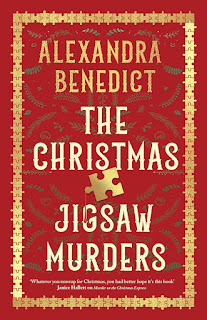 We seem to be overwhelmed with Christmas murder mysteries this year - in this case in a puzzler-friendly format as Alexandra Benedict throws in a number of optional challenges for the reader, from spotting references to Fleetwood Mac songs (always a Christmassy activity) to Dickens novel anagrams in the text and a Christmas song puzzle in the chapter headings.
We seem to be overwhelmed with Christmas murder mysteries this year - in this case in a puzzler-friendly format as Alexandra Benedict throws in a number of optional challenges for the reader, from spotting references to Fleetwood Mac songs (always a Christmassy activity) to Dickens novel anagrams in the text and a Christmas song puzzle in the chapter headings.If, like me, you just want to get on with the story, then there's a tangled web of relationships and past dark secrets to sort out in tracking down a series of murders that are accompanied by jigsaw puzzle pieces as clues. The murderer has devised these hints for the crossword-setting main character, Edie. The murder mystery itself is satisfying, and Benedict manages the build of clues and red herrings well. But I did have two problems.
The lesser one is that Benedict's writing style can be a little uneven. There are some over-baked similes (think 'tree branches reached for them like the bony hands of hair-ruffling aunts'), while things can get a little clunky - for example the opening page of chapter 10 where we get five paragraphs in a row that start with either 'Sean' or 'Liam' making it distinctly 'tell' rather than 'show'. The bigger one is Edie.
We've had something of a flood of late, thanks in part to the success of Richard Osman's books, of murder mysteries where the detectives are infuriating but somehow loveable older characters. Stretching the imagination more than a little, these amateur sleuths manage to get to the solution before or with the police. Edie also sets out to find the culprit - but there is nothing loveable about this octogenarian - she is awful. What's more, at least the Thursday Murder Club work with the police, even if they sometimes hold things back a while. Here Edie's great nephew/stepson is a police inspector, yet she withholds vital evidence, resulting in dire outcomes that would have any real person locked away.
Edie seems based on the idea that if you are a 'character' you can get away with anything - but she was so unlikable it partially spoiled the book for me - I'm sure you can draw a parallel with Scrooge, but I don't like Christmas Carol much either. Plenty of good stuff going on here, but it's not a book I can wholeheartedly recommend.
One weird addendum - the Amazon.com page for this book describes totally different characters, which is, to say the least, odd.
See all of Brian's online articles or subscribe to a weekly digest for free here You can buy The Christmas Jigsaw Murders from Amazon.co.uk, Amazon.com and Bookshop.org
Using these links earns us commission at no cost to you
December 20, 2023
The Thursday Murder Club - Richard Osman ****
 Until recently, I'd classified Richard Osman's cosy murder mysteries as 'not worth reading as it's only successful because he's on the TV'. But a friend's write up persuaded me to give them a try - and I confess they are better than expected, if not what I expected.
Until recently, I'd classified Richard Osman's cosy murder mysteries as 'not worth reading as it's only successful because he's on the TV'. But a friend's write up persuaded me to give them a try - and I confess they are better than expected, if not what I expected. I'm reviewing the first two books in the series together here because the first, The Thursday Murder Club, feels as if Osman hasn't quite decided what he's writing, while it becomes much clearer in the second book. After reading that, my impression of the first improved significantly.
The basics sound more than a little silly. A group of four OAPs in a retirement village attempt to crack old, unsolved murders as entertainment, but this activity draws them into sorting out a current case with the help of a pair of friendly police officers. (It also helps that one of the OAPs is ex-MI6.)
 What we get in that first title is a perfectly reasonably cosy murder mystery (a genre I generally enjoy) with some well thought out commentary on the nature of aging, loss and dementia. Osman effectively deploys short chapters to encourage 'just one more'. However, I did also have some issues. It's written in a particularly irritating present tense. The plot is a touch confused. And though the cover quotes ooze about how funny it is, I didn't find that all. The humour is primarily either 'aren't old people funny stuff', like the 'What is this Instagram thing?' type diary entries from one character (which diary sections unfortunately continue through the entire series), or 'Isn't it funny when old people pull one over on someone younger by foiling expectations.' I found it more patronising than funny.
What we get in that first title is a perfectly reasonably cosy murder mystery (a genre I generally enjoy) with some well thought out commentary on the nature of aging, loss and dementia. Osman effectively deploys short chapters to encourage 'just one more'. However, I did also have some issues. It's written in a particularly irritating present tense. The plot is a touch confused. And though the cover quotes ooze about how funny it is, I didn't find that all. The humour is primarily either 'aren't old people funny stuff', like the 'What is this Instagram thing?' type diary entries from one character (which diary sections unfortunately continue through the entire series), or 'Isn't it funny when old people pull one over on someone younger by foiling expectations.' I found it more patronising than funny.These negatives remained in the second title The Man Who Died Twice, but could be almost entirely dismissed because the caterpillar of volume 1 turned into a butterfly in volume 2. It now became far clearer that these aren't really cosy murder mysteries at all. They are Enid Blighton's Famous Five books, reimagined for grownups. A gang who the world discounts (substitute OAPs for children) take on spies, international criminals and the rest and overcome thanks to their wit, pluck and a degree of unexpected subversiveness. With this perspective, I have become a fan.
There's really no need to go into plots, or characters, any more than there's a need to do so with a Famous Five book. It's a fun, pure escapist read - with the added benefit of Osman's impressive grasp of the difficulties of growing old, combined with the release some older people feel from the pressures facing younger people.
See all of Brian's online articles or subscribe to a weekly digest for free here You can buy The Thursday Murder Club from Amazon.co.uk, Amazon.com and Bookshop.org and The Man Who Died Twice from Amazon.co.uk, Amazon.com and Bookshop.org
Using these links earns us commission at no cost to you
December 18, 2023
There's wrong and there's disastrously wrong
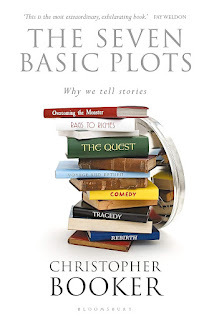 The other day, I was reading the late Christopher Booker's ridiculously long The Seven Basic Plots and came on a spot of science writing that made me gasp in its comprehensive inaccuracy. He is looking at creation myths, giving us three versions, the final being the Big Bang theory, which he tells us 'is still "telling a story", and in this sense we can look at it just as we would look at any other type of story.
The other day, I was reading the late Christopher Booker's ridiculously long The Seven Basic Plots and came on a spot of science writing that made me gasp in its comprehensive inaccuracy. He is looking at creation myths, giving us three versions, the final being the Big Bang theory, which he tells us 'is still "telling a story", and in this sense we can look at it just as we would look at any other type of story.Now, I have no problem at all with that statement. A scientific theory of any kind is definitely a form of narrative - and since cosmology tends to be at the more speculative end of science, because you can hardly replicate the experiment, it is particularly apt to think of it in this way. But here's the story that Booker tells us:
'The "Big Bang" theory of the creation of the universe suggests that in the beginning there was an agglomeration of hydrogen atoms, so tightly compressed together that it was only millimetres across and of almost infinite mass. This constituted, as it were, a 'Universal Egg' which contained the potential for all that was to follow. At a certain point, somewhere around 15 billion years ago, this 'Egg' exploded, with such force that electrons jumped from one nucleus to another, creating the atoms of all the other elements. These were the atoms which still constitute the physical universe and everything in it, including ourselves.'
Umm. The book was published in 2004, when 13.7 billion years was perhaps more popular than the current 13.8 billion years for the age of the universe - but no one was thinking 15 billion (hey, what's over a billion years between friends?). However, the excruciatingly bad part is the idea that we started with hydrogen atoms, and all the other elements were created in the Big Bang when 'electrons jumped from one nucleus to another.'
If Booker had bothered to read any basic popular science title at the time, he would surely not have been able to write such tripe. It did occur to me briefly that this was a joke on his part - assuming his readers would be ignorant of science, given the old C. P. Snow 'two cultures' divide (see this), he made up his Big Bang story to demonstrate how much it was just a myth. But I'm afraid it's almost certainly the case that he simply couldn't be bothered to check his facts, as this was science as opposed to his heavily researched literary text.
On the subject of story plots the book is interesting, if far too long. But, really? To use two of his basic plots, this bit of science writing veers between comedy and tragedy.
See all of Brian's online articles or subscribe to a weekly digest for free here You can buy The Seven Basic Plots from Amazon.co.uk, Amazon.com and Bookshop.org
Using these links earns us commission at no cost to you
December 14, 2023
Apology to science book lovers
 This time of year I mostly abandon popular science books for lighter reading. As a result, crime will feature frequently in my reviews, which will also often be Christmas- themed. Normal service will be resumed as soon as I've got through my Christmas reading pile.
This time of year I mostly abandon popular science books for lighter reading. As a result, crime will feature frequently in my reviews, which will also often be Christmas- themed. Normal service will be resumed as soon as I've got through my Christmas reading pile. Image by Mike Blank from Unsplash
See all of Brian's online articles or subscribe to a weekly digest for free here
December 13, 2023
The Christmas Guest - Peter Swanson ****
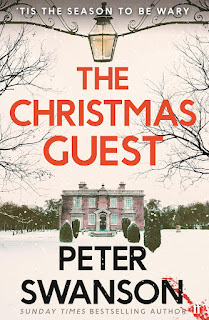 This novella gives us a highly engaging Christmas-set (technically it's in Advent) mystery. We start in the New York apartment of the female narrator, who, at Christmas time, unearths an old diary from exactly 30 years before, covering the days leading up to a horrible event in a Cotswold manor house.
This novella gives us a highly engaging Christmas-set (technically it's in Advent) mystery. We start in the New York apartment of the female narrator, who, at Christmas time, unearths an old diary from exactly 30 years before, covering the days leading up to a horrible event in a Cotswold manor house. The majority of the book consists of these diary entries from student days, which are mostly appropriately fluffy and young adult in feel. But at the heart of it all is something much darker.
It's hard to say more without giving anything away, but it's all very neatly done, with two big twists in quick succession about three quarters of the way through.
The only criticism I have is that once you've hit those twists, the ending is a little bit of a let down, as it feels like there should be a final twist to really finish things off - but it remains a really good, intriguing seasonal read, if you like Christmas with a murderous side.
I don't honestly know why Christmas and darkness go together so well, whether it's in the form of ghost stories or murder mysteries - but they do make excellent book-fellows.
See all of Brian's online articles or subscribe to a weekly digest for free here You can buy The Christmas Guest from Amazon.co.uk, Amazon.com and Bookshop.org
Using these links earns us commission at no cost to you
December 11, 2023
The Christmas Appeal - Janice Hallett ****
 Janice Hallett has rapidly become the best active light crime writer, bettering her first two books with the outstanding
The Mysterious Case of the Alperton Angels
, so I rushed to purchase her latest, a Christmas sequel to her remarkable debut
The Appeal
. Written in her distinctive modern epistolary style - in this case primarily featuring emails and WhatsApp messages, it is an entertaining piece of fluff, but not up to the usual standard.
Janice Hallett has rapidly become the best active light crime writer, bettering her first two books with the outstanding
The Mysterious Case of the Alperton Angels
, so I rushed to purchase her latest, a Christmas sequel to her remarkable debut
The Appeal
. Written in her distinctive modern epistolary style - in this case primarily featuring emails and WhatsApp messages, it is an entertaining piece of fluff, but not up to the usual standard.Let's get the good part in first. The storyline features a pantomime, and there is a particularly strong thread of humour here - more so than usual in her books. Christmas always makes a great setting for a cosy mystery, and this comes across nicely here. There was one point (featuring a dog and a bone) when I laughed out loud and plenty more to smile at. As always, Hallett manages brilliantly at using the apparently distancing style of collecting written communications to really get us into the heads of the characters and to keep track of a tangled plot.
The downside, though, that does make this feel a little rushed as a book (it's also more novella than novel) is that the plot itself lacks the wow factor that the previous books have provided. When all is revealed, it's a bit 'Okay, fine. So that's what happened,' but it's hard to get engrossed in it. I'd also say that a sub-plot where an order for wrapped sweets to give out after the production goes horribly wrong was just too farcical, even for a pantomime, let alone a crime novel.
All in all, by far Hallett's weakest outing. Yet she is so good that it still beats a fair number of the Christmas mysteries that will be new on the shelves this year.
See all of Brian's online articles or subscribe to a weekly digest for free here You can buy The Christmas Appeal from Amazon.co.uk, Amazon.com and Bookshop.org
Using these links earns us commission at no cost to you
December 4, 2023
On reviewing old books
 This week I'm reviewing two books on the Popular Science website, neither of which was published this year. Usually, book reviews are of the latest titles. This is partly because these are the titles publishers are enthusiastic to get seen, but also tend to be selected to ensure that the reviewer seems current. I think, though, that there are several reasons to consider a book that's been around a while.
This week I'm reviewing two books on the Popular Science website, neither of which was published this year. Usually, book reviews are of the latest titles. This is partly because these are the titles publishers are enthusiastic to get seen, but also tend to be selected to ensure that the reviewer seems current. I think, though, that there are several reasons to consider a book that's been around a while.Sometimes it's because there's a new edition. This may not make much difference to the content, but the book might have been out of print or otherwise hard to come by. Occasionally there may also be genuinely interesting new content (as opposed to yet another preface no one wants to read). I've got a lot in the past out of some annotated books, though my experience with Frankenstein 'annotated for scientists, Engineers and Creators of all kinds' was not great. One of my reviews this week will be a new edition.
The visibility created by a new edition (even if it's just a paperback following the hardback) can also mean that a book you overlooked the first time around comes to your attention (or, frankly, becomes more affordable). This is the case with my other review this week - a book that I initially missed and then, frankly, intentionally avoided because it got so much hype that I was put off. Not at all fair, but I find i easy to take this stance. Finally, though, when the dust was settling (and some of the comments were getting more critical) I gave in and bought a copy.
One other way an older book review might get published is a look back at an old review. This may be simply to bring a forgotten delight back to visibility, or it could be that, on a re-read, the book seems very different from the experience the first time around.
It's entirely possible that your reaction to a review of a book published in 1999, as is the case with one of my reviews is 'So what? It's old news.' But I don't think books necessarily become old, nor is a review news. I'm not generally a great enthusiast for 'the classics' - I confess, I struggle, for instance with the verbosity and silly names of Dickens. But I'm a sucker for Jane Austen. In non-fiction, and popular science in particular, there are fewer classics that hold up well, partly because science moves on, and also because non-fiction styles from, say, the 1930s or 1950s can seem very turgid now. However, I believe it would be a mistake to stick purely to the latest titles, and hope that I will continue digging up the occasional blast from the past.
Image by Chris Lawton from Unsplash - when I say 'old books' I don't mean ones likes these
See all of Brian's online articles or subscribe to a weekly digest for free here
November 29, 2023
Revenge of the boffinophiles
 I was going to call this post ‘lovin’ a good boffin’, but it felt too much like a double entendre.
I was going to call this post ‘lovin’ a good boffin’, but it felt too much like a double entendre. The term 'boffin' is an outdated British term for a scientist, which now only crops up in tabloid newspapers. It's an affectionate term, but with an element of mad scientist about it. For some time now, the Institute of Physics has been running a campaign to 'bin the boffin'.
In a Physics World article, Rachel Youngman puts the case for binning the boffin: 'We believe that boffin is a lousy way to talk about scientists. The term has negative impacts – it is poorly understood, strongly associated with the male gender and is confusing. When we surveyed our members last year, they told us that the term was unhelpful and inaccurate, with younger members stating it actively puts them off science.' You might wonder, if they were put off science what they're doing being members of the Institute of Physics, but that's a different story.
I love the Institute of Physics (and their magazine/website Physics World) dearly - but there is a real danger of coming across as humourless, perhaps even po-faced, in this campaign. You don't stop people using a nickname for you that you don't like by moaning about it - that just makes people double down. And there's even an argument that it's not a bad name for a certain kind of scientific announcement.
Part of the IoP's campaign involves publicising the week's 'best worst example of boffin in the media'. One week in October the headline they picked up on was ' Boffins use science to calculate the scariest scenes in horror movie history'. To be honest, when someone (usually a PR company who get the assistance of a gullible scientist) comes up with this kind of pseudoscientific guff, they deserve to be labelled boffins (or something far worse).
The IoP's PR effort is made for the best reasons - and Youngman describes it as a 'good-humoured call', noting that they aren't seeking to ban the word: 'If a pub quiz team, say, wants to be called “Brilliant boffins” that’s fine and if scientists don’t mind the word, then we would consider that a matter of personal taste.' If it is indeed true that 'boffin' conjures up an image of only one kind of scientist (white, male, lab coat...), then it's not ideal for general use. But to be fair, it isn't in general use and hasn't been since the 1950s. The word didn't originally mean a scientist at all - it was a term for an elderly naval officer in the early years of the Second World War, that expanded to mean someone in backroom science and technology, who was away from the military front line, particularly those developing radar. It was already dated by the 1970s.
For me, the campaign distracts from the message of science. When my Twitter/X list about science is full not of science stories but stories about whether people are using the right words, I don't think that science does itself justice.
Image from Unsplash/National Cancer Institute - n.b. boffin images should always be black and white
See all of Brian's online articles or subscribe to a weekly digest for free here
November 28, 2023
Obvious in Hindsight - Bradley Tusk ***(*)
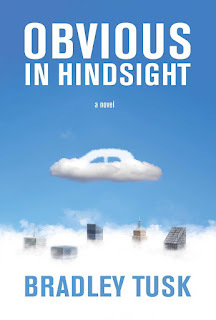 The premise of this novel is excellent - it's a cross between House of Cards and The Circle. A tech company is attempting to get its flying cars off the ground (both literally and metaphorically). The company's erratic CEO has brought in a political lobbying company, because it's no easy job to get permission for flying cars in the skies of a city (their initial targets are New York, Los Angeles and Austin). Meanwhile it's also no easy job to get the car to fly safely at all.
The premise of this novel is excellent - it's a cross between House of Cards and The Circle. A tech company is attempting to get its flying cars off the ground (both literally and metaphorically). The company's erratic CEO has brought in a political lobbying company, because it's no easy job to get permission for flying cars in the skies of a city (their initial targets are New York, Los Angeles and Austin). Meanwhile it's also no easy job to get the car to fly safely at all.Bradley Tusk - who has been both a political operator and a venture capitalist, so has an ideal background - brings to the fore the two people at the top of the lobbyists - the ruthless Nick and his number two, Lisa (arguably the main protagonist), Susan the CEO, and her chief engineer, Yevgeny. They join a large cast of characters from FBI agents to corrupt city mayors and union bosses. Tusk also gives a very cynical (but probably accurate) picture of the totally self-serving nature of US politics.
It's a great storyline, even if it does verge more into Tom Sharpe territory later on (more on that in a moment). And I enjoyed reading it. I'd definitely give it four stars for the ideas. But it could have been better. Tusk's writing style isn't particularly engaging. We get too many characters thrown at us, without the space to develop (or even, occasionally, to keep track of who is who). And the dramatic tension isn't particularly well handled. It's not really a page turner.
In case you aren't familiar with Tom Sharpe, he was a British satirical novelist who particularly took on academia (both new universities and Cambridge), using sledgehammer-unsubtle farcical situations. What I really wanted Obvious in Hindsight to be (what is that title about?) was a sizzling political thriller, like House of Cards, with the added fun of the dodgy goings on of the tech billionaires (hence my reference to The Circle). And there are bits where this happens. But, presumably in an attempt to add humour, we also get deeply farcical elements, such as FBI agents (one of whom is obsessed with disgusting sounding eating contests) operating from a kosher Mexican Korean food truck - and then there is the public test of the flying car where the passenger is a steer (a bullock in English English) that also happens to be the mascot of a college football team. What could possibly go wrong?
It was so close to being a really good book that I genuinely do recommend giving it a go - but it should have had more of an editorial steer (not a bullock).
See all of Brian's online articles or subscribe to a weekly digest for free here You can buy Obvious in Hindsight from Amazon.co.uk and Amazon.com
Using these links earns us commission at no cost to you



